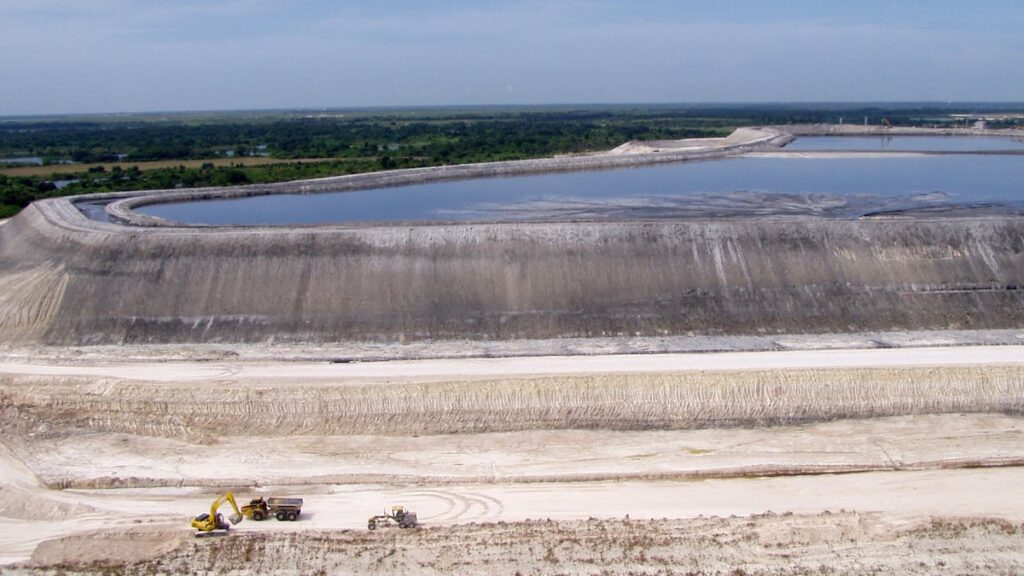Ideally, roads should not be contaminated with radioactive materials.
The concept brings to mind scientists wearing white hazmat suits who cautiously approach contaminated blacktop, and Geiger crackles back.
Click…click…click, click, click, click.
Radioactive roads sound like the deadly gauntlet of a dystopian sci-fi thriller, a silent, emotionless threat.
So, of course, Florida is going to build it.
that’s ok.
That’s really true.
In the real world, radiation is all around us. It is also within us. It’s also measurable, and researchers have a firm grasp on how much is too much. So the better question is not, “Something emits radiation, but is it safe?” The state’s new roads should bring us closer to that answer.
The federal government recently approved Mosaic’s plan to use 1,200 tons of phosphogypsum to build a road at one of the company’s mining facilities in Polk County. Phosphogypsum, a byproduct of manufactured fertilizer, is mixed with traditional road construction materials to form the 10-inch base layer of the road.
Phosphogypsum is slightly radioactive, has a high concentration of radium, and can decay into radon. It’s true that radon is linked to cancer, but after extensive analysis, the U.S. Environmental Protection Agency says the project’s risk is “low.” This approval applies only to this test road and does not apply to broader uses.
Mosaic, a Fortune 500 company based in Tampa, isn’t doing this alone. University of Florida researchers will monitor and study 3,200 feet of road. During construction, workers will wear personal radiation detectors, and teams will install detectors near roads. Researchers will also monitor air quality as workers mix waste on site. The team will continue to test water quality in nearby wells, collect soil samples and measure radiation levels nearby. The public does not use the road.
Construction will begin later this year, and Mosaic and researchers will evaluate the road for at least 18 months, a company spokeswoman said.
Still anxious? It might be helpful to know that this has been done before. Canada and some European countries use phosphogypsum to build small-scale roads. Some people have spread it on their farmlands.
The state of Florida used this product to build two experimental roads in Polk and Columbia counties in 1986 and 1987. The project was overseen by the University of Miami, the Polk County and Columbia Department of Public Works, and the Florida Department of Transportation. According to research, this material increased the durability of roads and helped cut construction costs by more than half. A University of Miami study found that the road had no measurable impact on groundwater and there were no significant changes in radium-226 levels in the soil surrounding the road.
Spend your days with Haze
Subscribe to the free Stephinitely Newsletter
Columnist Stephanie Hayes shares her thoughts, feelings, and interesting business stories every Monday.
Everyone is registered!
Want more free weekly newsletters sent to your inbox? Get started.
consider all options
It’s easy to shout, “That’s not true!” With Mosaic Road Ideas. But ignoring this potential solution based on fear rather than fact doesn’t make the problem go away. The gypsum piles, some 200 feet tall and covering hundreds of acres, are still there, slightly filled with radioactive waste, waiting to cause their own kind of environmental damage.
In just the past 15 years, 84 million gallons of wastewater have been released from the plasterwork sinkholes in White Springs. Another sinkhole drained 215 million gallons of wastewater from the Mulberry gypsum stack into the aquifer below. Mosaic discovered contaminated water seeping out of the Bartow factory’s chimney. Four years ago, a huge pond on the Piney Point property leaked and threatened to burst, forcing state leaders to approve the release of more than 200 million gallons of contaminated water into Tampa Bay. . As history has shown, soon another plaster stack will leak.
The state should not have allowed phosphate mining companies to build such a stack of time bombs. However, gripping doesn’t solve the problem. States and businesses must have sufficient space to explore innovative solutions. Mosaic’s test results may reveal that widespread use of this waste is too dangerous. However, road construction may prove to be an effective method of chipping away at plasterwork. Either way, you’ll have to find out.
Skeptics argue that the mosaic path will resemble an irradiated camel’s nose poking out from under the proverbial tent flap. They imagine obedient elected leaders responding to the demands of big corporations. A good way to alleviate these concerns is for Mosaic and the state to be 100% transparent about their findings. We will publish all the data on the roads, both good and bad. Was the construction work safe? How much radiation got into the soil and water? Did the road survive the Florida climate?
“At the end of the day, we welcome thorough testing,” Sara Fedorchuk, Mosaic’s vice president of government and public affairs, said in response to my questions. “We want people to know that this is not wasted, but a safe and valuable resource. And we want others to realize that a long time ago. We are decades behind.”
Many of the big decisions in life require measuring risk. In this case, calculations should not be distorted by the understandable but often exaggerated fear of radiation. This path is a wise and well-controlled test.
It’s actually not that scary.

